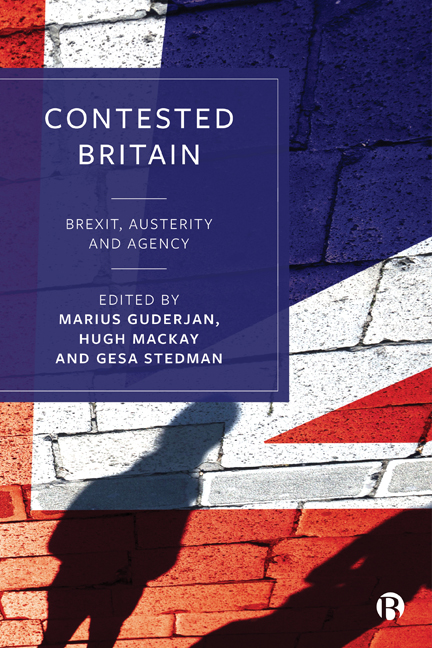12 - Understanding Brexit in Wales: Austerity, Elites and National Identity
Published online by Cambridge University Press: 10 March 2021
Summary
At first glance, the figures show that support for Brexit in Wales was similar to that in England. As in England, there was a correlation in Wales between voting preference in the referendum with age, level of education, a concern about immigration driving wages down and generating pressure on public services, political alienation and authoritarian attitudes (Seidler, 2018; Awan-Scully 2017). An important issue for Leave voters was a sense that those with power were looking after themselves rather than after ‘us’, the ‘ordinary people’. Voting Leave was thus a political act against the establishment, against those who run the country.
Despite these important commonalities across the nations of the UK, one can identify distinctive dimensions of support for Brexit in Wales. These are the focus of this chapter. Compared with England, Wales is poorer and the devolved government is more social-democratic. It also has an elite with different characteristics from the English elite and a powerful sense of Welsh national identity. This chapter takes as its starting point the similarity in voting in Wales and England, but suggests that this might be for different reasons. It argues that the Leave vote in Wales was lower than might be expected given the demographics of Wales because of (a) the nature of the elite in Wales and (b) national identity in Wales.
This chapter explores some implications of the distinct nature of the elite in Wales for Leave voters, for many of whom voting Leave was voting against the elite. By and large, the Welsh elite is not an economic elite but a cultural, political and professional one. While Wales shares much of its history with England, its history is also divergent – in terms of its incorporation with England in the 1536 Act of Union, its language, its limited economic power, its poverty and its Labour traditions. Together these mean that, in Wales, members of the elite are much less separated from ordinary people, that social hierarchies are less harsh or obvious (Clayton, 2013).
The other issue addressed in this chapter is the connection between national identity and voting Leave. The chapter explains that in England, those with the strongest sense of English national identity voted most heavily for Leave, whereas those who identified as British more than English tended to vote Remain.
- Type
- Chapter
- Information
- Contested BritainBrexit, Austerity and Agency, pp. 175 - 188Publisher: Bristol University PressPrint publication year: 2020



